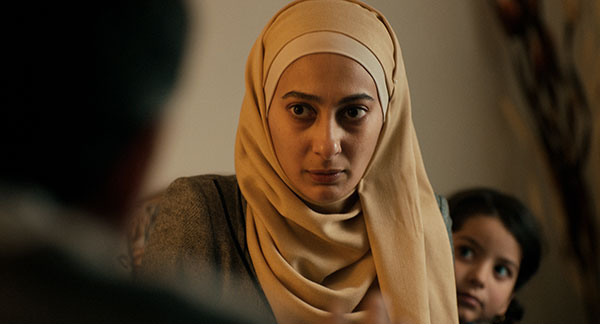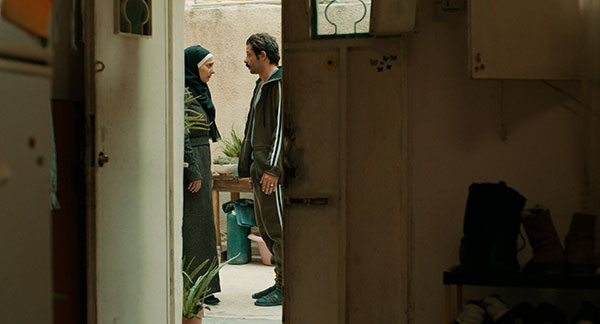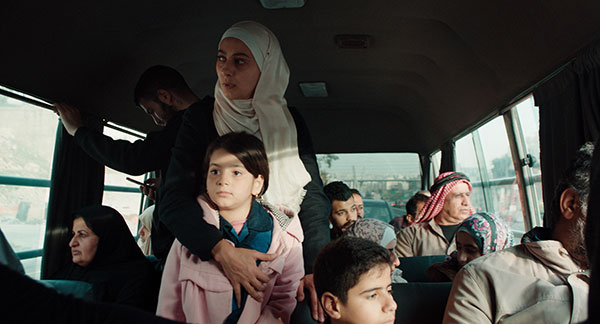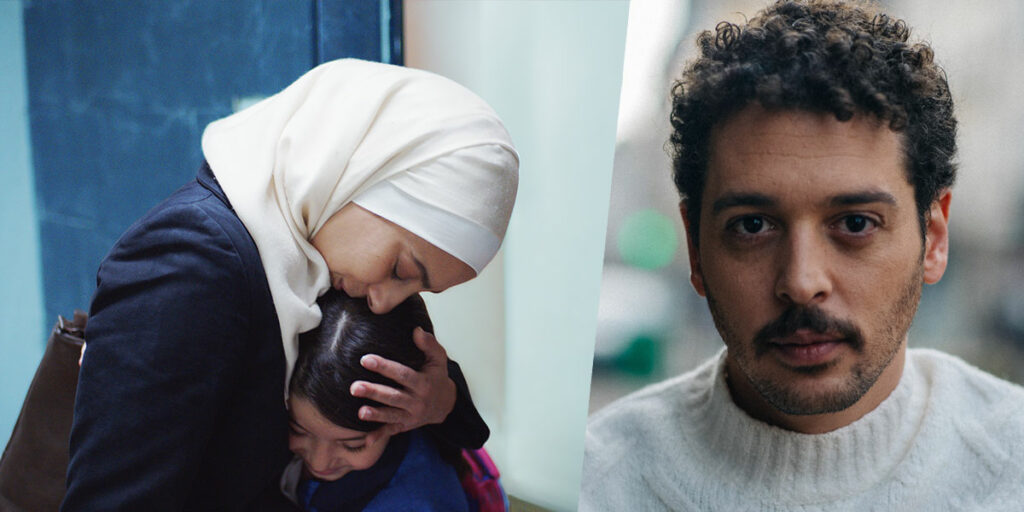We interview director Amjad Al Rasheed about Inshallah A Boy, the first Jordanian film to ever premiere at the Cannes film festival.
The first Jordanian film to ever premiere in Cannes was one of the first films I watched at the festival, and also a movie I immediately fell in love with it: as the credits rolled and so many questions popped up in my head, I knew I had to interview the director. In Inshallah A Boy (Inchallah un Fils), filmmaker Amjad Al Rasheed and co-writers Delphine Agut and Rula Nasser tell us the story of a 30 years old woman (Nawal, played by Mouna Hawa) who one day wakes up to find her husband Adnan dead, which leaves her alone to look after their daughter Nora (Seleena Rababah). But in Jordanian society, there are even more complications to consider, as Nawal is a widow with no sons, and that means that she might lose her house and her custody of her daughter.
Nawal’s brother-in-law Rifqi (Haitham Omari), and her own brother Ahmad (Mohammad Al Jizawi) are the two men who bring the news, as the former gently but firmly instructs her to first sell her husband’s car to pay for his alleged debts, and then insists that he’s entitled to a share of her house and even the custody of her daughter, and the latter agrees with Rifqi, reminding his sister that “this is how things work.” And that is, indeed, how things work in Jordan, where these patriarchal laws are so deeply rooted in society that many fail to understand how wrong they are.
Inshallah A Boy delves into these unjust inheritance laws by taking us on a claustrophobic, nightmarish journey that feels like a theatre play. But director Amjad Al Rasheed manages to do more than that too, with a comprehensive look at Jordanian society and its treatment of women, that explores anything from religion, motherhood and abortion to generational and social differences and the very idea of sin. It’s a movie that balances tragedy with irony, with authentic characters that you’ll either root for or despise, but also, ultimately, understand. And, astonishingly, it’s also a feature debut.
At the Cannes World Premiere of Inshallah A Boy, we speak with director (and “Arab Star of Tomorrow”) Amjad Al Rasheed, who tells us about the origins of this story, the moral questions he wants to ask, the women and men in Inshallah A Boy, and the real film that begins when we leave the theater. Read the interview below!
Amjad Al Rasheed on Bringing the First Jordanian Film to Cannes
What does it feel like to be the ambassador of Jordanian cinema?
Amjad Al Rasheed: So happy! It’s the first Jordanian film in Cannes, and it’s funny, because it was a dream, but I never thought that it would come true, at least not with my first picture. Before coming to Cannes, the other day I had an interview with a local channel, and they told me, “You are a national hero!” [laughs]. It feels great, but it also comes with a big responsibility: that of presenting Jordan at such a huge festival, and also that of what I’m going to do next. I’m already preparing something: I’m in the early stages of development. But yeah, it’s scary now, because I need to do something even better.

Why do you think it took so long for Jordanian cinema to arrive in Cannes?
A.A.R.: We are a young industry. It all started with the Royal Film Commission in 2005, I think. Jordanian films started going to different big festivals: Venice, Locarno… I can’t call it an industry yet: it’s a cinematic movement. Look at the countries that have film industries: the US/Hollywood, Egypt, India, for example… To call it an industry, it should have an infrastructure. Right now, each four or five years we have these three films that come from Jordan and go to festivals, and are well received. And we have a fantastic, professional group, because films have been shot in Jordan for 20 years now. Our crew is very well trained, very talented, and very professional: we’re blessed with that. But I think it’s too early to call it an industry: it’s a movement.
How do you think Jordanian audiences are going to receive Inshallah A Boy?
A.A.R.: I hope well! I understand that it will be a tough film for Jordanian audiences, as our industry is young. We don’t have lots of films coming from Jordan, so we, the audience, are not used to watching them. We’re not used to standing in front of a mirror, even if it’s an ugly one. Jordanian audiences are very sensitive. When they see these kinds of depictions, they immediately attack them, and they say, “this does not represent our culture and does not represent Jordan”. We don’t understand that cinema does not have to portray our country in a beautiful way. It’s not like an advertisement for the country. We still need to work on the mindset, thoughts, and beliefs of the people. And it all starts with education.
The Origins of Inshallah A Boy
Inshallah A Boy is so complex and full of layers. How long did it did it take you to make it?
Amjad Al Rasheed: It took me six years. Including two years of COVID, of course, so there was a pause, in between.
When did you know you were going to tell this story?
A.A.R.: The idea came from a close relative of mine who was almost in the same situation of my main character. And when she was in that situation… It’s interesting, because I usually get inspired by a question: What if? It’s what inspires me and motivates my mind to think of a story: if I find this question, I find the story. So when my close relative was in that situation, I thought, What if she said no? What if she wanted to fight? What would her options be? And how is it possible that we are still ruled by these laws? It’s absurd to me. So I started doing the research, and the story was complete in my mind.
Would you describe yourself as a feminist?
A.A.R.: No, I’m a human being. I know, it’s a story about a woman. But we need to stop thinking of gender: this story has no gender and no sexuality. Yes, I’m a man, and I’m telling the story of a woman. But we’re both human beings, you know? These stories, and cinema, don’t have a gender: it’s just what we experience around us. Now, we also want cinema to reflect these experiences.

Amjad Al Rasheed Asks a Moral Question in Inshallah A Boy
What really struck me is your portrayal of the men in this story. On one hand, we hate them so much because of how difficult they’re making it for Nawal: for example, her brother and brother in law, who keep coming to her house. And then there’s this third man at work who seems really friendly, but then we realise that men can be either saviours or executioners.
And at the same time, like Rifqi says, “this is our right: it’s how things work.” So we also understand that it’s not their fault, because they don’t get it.
Amjad Al Rasheed: Yeah. First of all, I decided to put all the characters in a grey zone, where, whether they’re antagonists or protagonists, we understand where they’re coming from. I believe that, with modern storytelling, in our day and age, we can’t portray any character unless they’re in a grey zone, because we, as human beings, have both qualities: the evil and the good. It depends on the circumstances. And the situation we are in, when our evil or goodness comes through, also depends on our education, exposure, and how we deal with things.
It was very important for me to portray men in this zone, because I want to ask a moral question there. Even if you have the rights, and you have the laws backing you, would you do it? It was very important for me to make the audience think. I believe that we are in a critical time, where we need to think more of what has been normalised for us, for 100 years now. And, as human beings, we need to reassess these behaviours against humans in general, not only in Jordan or in the Middle East, but in the whole world.
Do you think new generations are trying to turn that around – this normalisation?
A.A.R.: I’m not very hopeful. I feel it needs a lot of work: we need to talk more about it and to have an open, honest conversation about it. You know, we have this famous saying, “the woman is half of the society.” But how will our society be developed and move forward, when half of it is suffering from inequality? They can’t do anything: they can’t even control their body or their lives.
It’s absurd that we’re still ruled by these laws that were created thousands of years ago, and I’m not talking about one religion: I’m talking about all religions. All religions are male-dominant and patriarchal. It’s time that we reassess these things. And yes, I’m talking about the specific laws in Jordan, the Middle East, and Islamic countries, but it echoes other laws, like with salaries for example, in Europe and in the US or in the West. It’s not something that’s only specific to our region. It’s all over.
The Women in Inshallah A Boy, and the Real Women Behind Them
I love that this is a generational story. There are so many women in the film: not just Nawal and her daughter, whose relationship already brings interesting dynamics, but also Nawal’s neighbours. And then, the people Nawal works for, where we get to see different generations of women.
Amjad Al Rasheed: Definitely. At some point in my mother and my grandmother’s generations, we were much more open as a society. And there was a shift in our behaviours and beliefs, because of what’s going on in the Middle East. So I wanted to show that. For example, the old lady [the woman Nawal looks after, who has Alzheimer’s] is like a silent, forgotten memory of how we were before the chaos started in our region. The little girl [Nawal’s daughter Nora] is the hope, the future. And this is why it was important for Nawal, at some point in the film, with her evolution as a character, to teach her. Nawal is a model for her daughter: she wants her to be strong, and I believe it all comes with education. If we want to have hope, we need to start with these new generations.

Another woman in the film is Lauren (Yumna Marwan), the daughter of Nawal’s employer. Her character brings in issues such as motherhood, abortion and the idea of “sin”. There’s a point where a doctor tells her that he won’t operate if there’s a pulse, because “a pulse means there’s a soul, and killing a soul is a crime.” It’s such a powerful scene.
A.A.R.: Yeah. Actually, much of the dialogue comes from real situations. While I was doing research for the film, I had the chance to sit with different women, or even to listen to my friends’ reactions when I talked about this story. And I’d usually get something like, “Oh, this happened to me”, or “this happened to my sister”, or to their friends. And they’d tell me what happened. So I saved these lines. The scene you’re talking about was inspired by a true situation: this is what a doctor actually told someone.
Amjad Al Rasheed Wants Us to Have a Conversation
What message would you like people, and international audiences in particular, to get from Inshallah A Boy?
Amjad Al Rasheed: I don’t believe in messages through cinema. I hope that, when people follow the story of Nawaz, the film opens a conversation and people start raising questions. I believe the real film starts after people leave the theater, and it should stay with them and open a conversation. I really hope it does.
This interview has been edited for length and clarity.
Inshallah A Boy premiered at the Cannes Film Festival‘s Semaine de la Critique on May 18, 2023 and will be released in US theaters on January 12, 2024.

